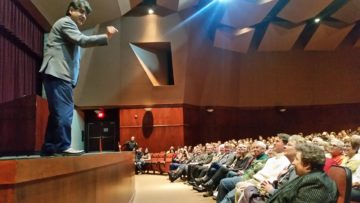By JAN LARSON McLAUGHLIN
BG Independent News
Readers familiar with Sherman Alexie probably weren’t expecting him to sit back in a leather chair and stoically read from his novels. But they may not have been expecting him to slaughter so many sacred cows.
“You have billboards of me,” Alexie said to the sold out crowd at the Bowling Green Performing Arts Center, Thursday evening. “I saw it and I wanted to put a Bible verse up.” Not a real verse, but something like “Jason 99:12” just to mess with people.
He warned that he wasn’t a typical Native American. If the audience was waiting for him to thank them for welcoming him here, they could just keep waiting.
“You f—— stole everything in Ohio,” he said.
He poked fun at pompous professors, conservative Christians, white Americans who are anti-immigrant, and ultra protective parents who won’t get their children immunized.
“This is from a person whose entire race was almost wiped out by smallpox,” he said. “F— you.”
He also warned the audience wanting autographs after the program to avoid one particular topic of conversation.
“Later a lot of you are going to come up and tell me you’re part Indian,” he said. “There’s no such thing as being a part-time Indian.”
But the author also poked fun at himself.
This was Alexie’s second visit to Bowling Green, the first being 17 years ago when he spoke at BGSU. On Thursday when the woman who hosted his previous visit raised her hand in the crowd, the author asked, “Did we make out? I used to be a pretty literary wonder boy … Now I’m 50.”
Alexie, who grew up on the Spokane Indian Reservation, writes poetry, short stories and novels, many of them based on his own experiences. One of his best known books is “The Lone Ranger and Tonto Fistfight in Heaven,” a collection of short-stories which was made into the film “Smoke Signals.” His first novel was “Reservation Blues.”
The author’s visit to Bowling Green was sponsored by the Wood County District Public Library as this year’s Community Reads focus.
In his semi-autobiographical “The Absolutely True Diary of a Part-Time Indian,” Alexie writes about being so poor that it couldn’t be romanticized. Sometimes sleep was the only thing his family had for dinner. He tells of living on the reservation located “one million miles north of Important and one billion miles west of Happy.” He writes of attending 42 funerals by the time he was 14 – including for his grandma who was hit by a drunk driver, his sister who was drunk and killed in a fire, and his dad’s friend who was shot in the face over the last swig out of a wine bottle.

Sherman Alexie talks to sold out crowd in BG Performing Arts Center.
Alexie warned his audience that his talk would be full of twists and turns. “Tangents are sacred in my tribe,” he said.
He talked about being born with hydrocephalus, with an abnormally large amount of cerebral fluid in the cranial cavity. His mother knew something was wrong, but each time she took him to the Indian Health Services, she was turned away.
Alexie was only diagnosed with hydrocephalus after his not-so-smart cousin put him on a swing when the author was just 5 months old. It was not one of those new swings with all the safety gadgets, but just a U-shaped strap.
An audience member provided a tangent when she shouted out that at least it wasn’t a flat board swing.
“Are you Laura Ingalls Wilder?” Alexie asked her.
When he finally wound back around to the swing story, his little body and big head were bouncing on the ground. The accident turned into a “highly sacred moment,” since at the hospital Alexie was finally properly diagnosed with hydrocephalus.
The story was pure America, with the doctor being a Greek Muslim, helping a poor boy from the reservation. The doctor’s bedside manner was lacking, though, and he told Alexie’s mom that her son would likely die or be left a “vegetable” from the surgery.
Alexie’s mom asked, “what kind of vegetable,” or at least that’s the story she always told her son.
“My head is still enormous,” he said, warning the audience about selfies they may take with him. “Your little heads are going to be like Pluto next to the sun.”
He grew up having seizures, and with 42 teeth, on a reservation where “getting an ear infection was life threatening,” since antibiotics weren’t always available.
His family was “reservation poor,” similar to white rural poor in Ohio. “We can bond over government cheese,” he said. “When I found out poor white people got it too, I was kind of mad.”
And he also had to wear “government glasses,” with thick black rims that are now stylish, he said, pointing out many in the audience. But the ones he had as a child magnified his eyes to different sizes.
As he paced the stage, Alexie flipped back and forth between his “urban Indian” style of speech and the accent from the reservation. “All I have to do is hear it again and it comes right back.”
He also strutted across the stage and did his best academia impersonation.
“How does your work apply to the oral tradition,” those with “more degrees than common sense” frequently ask him. “As if I write in a cave.” All stories – no matter what culture – started orally. “And yet, you assign us that more primal value,” he said. “You’re always looking for purity in us. Maybe it’s because you feel guilty for what happened.”
He took some jabs at Christianity, which is based on “a dude who got beaten to death and then rose from the dead. You worship a zombie,” he said. “And you thought we were weird because everything had a spirit.”
Alexie said he is not a spiritually powerful Native American, but he’s not above faking it. “We love that stuff. So we all pretend,” he said. “I’m a secular Native American. I belong to the church of coincidence.”
He was aware that some parents worry about children reading his books.
“I want them to read wholesome children’s literature, like ‘Hansel and Gretel,’” he mimicked.
“The most violent book I’ve ever read is the Bible,” he said, comparing it to a Stephen King novel.
Storytelling is what separates humans from other species. “This is what makes us humans. Animals don’t do this. I have a dog. My dog does not tells stories.” Alexie demonstrated the power of storytelling by getting the audience to react with laughter or with gasps of fear just by changing a few words in a story. “Storytellers are manipulators.”
He held the audience’s attention, offering to share the secret of human souls. “Words” he whispered over and over.
His love of words and learning led him to make a life-changing decision when in seventh grade he opened up his math book and found it was so outdated that it had been used by his mom. He knew that leaving the reservation school was his only hope of success.
Advancements are made “because people left home. Nothing has ever been created because people stayed home.”
But leaving was difficult. “We did a family tree in sixth grade and everyone was related. Even the teacher.” People just did not leave the reservation.
Alexie’s parents supported his decision to go to a white school in Reardon, 22 miles from home – though many days the young author had to walk since his family had no gas money.
“Those grain fields were my Atlantic Ocean. The grain tower in Reardon was my Statue of Liberty,” he said of his daily journey to school. “Do you understand how American I am?” But he said that being an immigrant and being an American are “the same things.”
Criticizing the “patriotic” U.S. citizens who have turned their backs on the most American narrative of welcoming those from other countries, he noted the irony of the United States suddenly becoming vehemently anti-immigrant. “And it’s an Indian dude telling you this.” Imagine people coming from somewhere else, “stealing our land,” bringing disease and crime. Those concerns are “really funny to us,” he said.




